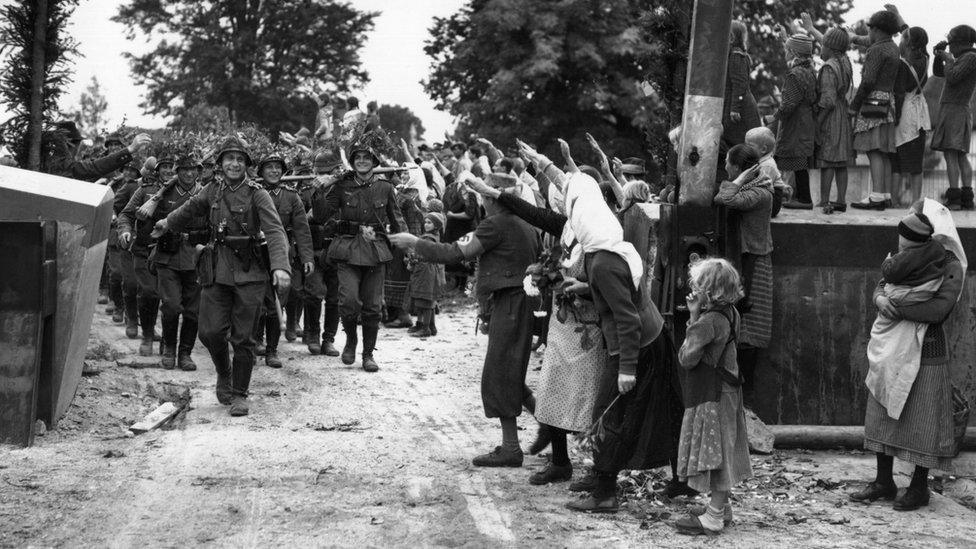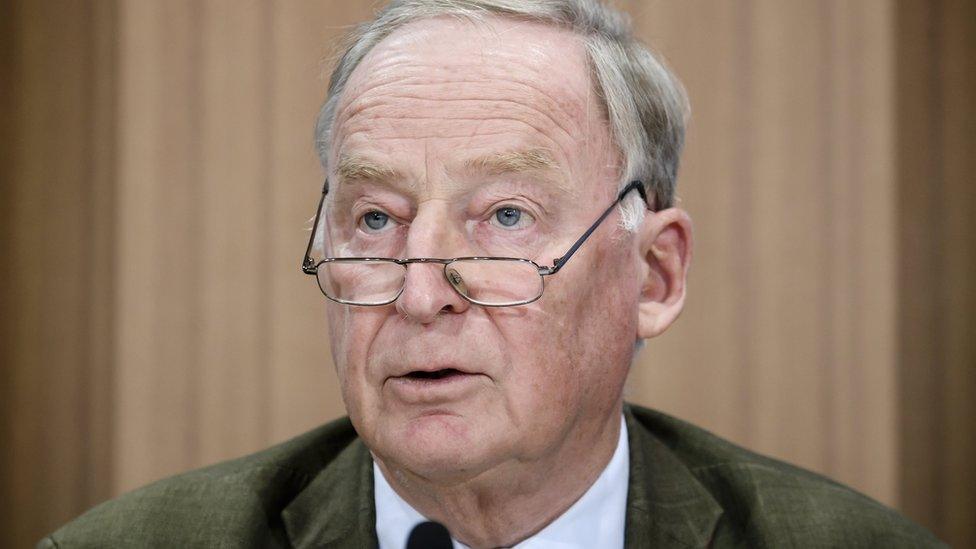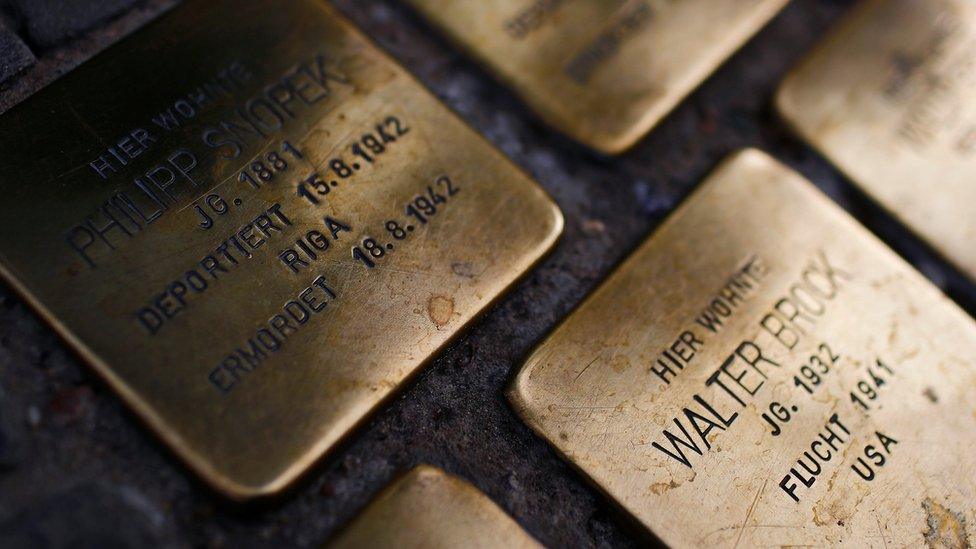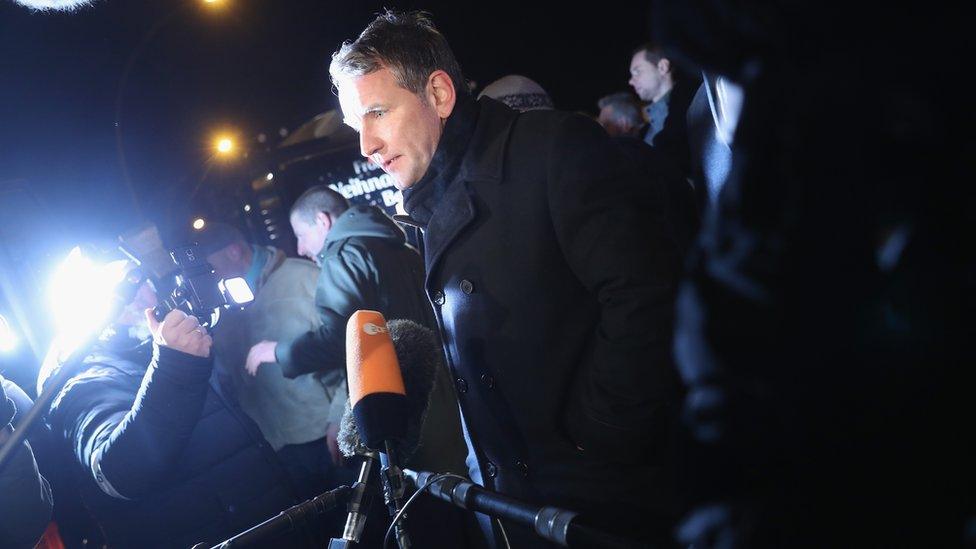Storm over 'pride in WW2 soldiers' remarks in Germany
- Published

Mainstream opinion sees the Wehrmacht as a willing tool of the Nazis
A candidate of Germany's right-wing nationalist party has said the country should "be proud of" its soldiers in both world wars and people should no longer "reproach" Germans for World War Two. Alexander Gauland's words have been met with some scorn. What pride are Germans likely to muster for the Wehrmacht?
Germany is "very devoted to a discussion of its past", Andrew Cohen, a Canadian journalist and professor, tells the BBC.
"I have not seen a country anywhere that is as committed to a frank and painful discussion of its history as Germany is."
Making a Nazi salute or denying the Holocaust in Germany could land you in jail - alongside swastikas and other Nazi symbols they are illegal.
And the country takes pains to make sure the horrors of World War Two are remembered, respectfully, with a view to preventing them happening again. Cities are full of sites dedicated to the Holocaust, from big museums and concentration camp memorials to tiny plaques in the ground, the size of cobblestones, that you may notice by chance when in the middle of something else.
Some have said it is too much - a decade ago already Der Spiegel published an article, external decrying the "mania for commemoration" and quoting the essayist Wolf Jobst Siedler saying: "If the Germans were once the greatest sinners, they now apparently want to be the greatest penitents."
'Willing instrument'
The army (Wehrmacht) did not run the concentration camps - that was the role of the SS. But it committed atrocities of its own including shooting thousands of Polish people.
"The mainstream approach is that the Wehrmacht was a willing instrument of the Nazi perpetrators as an institution," says Michael Wolffson, an Israeli-German historian at the University of the Armed Forces in Munich.
"Many things are commemorated - resistance to the Nazis, victims such as Jews, Gypsies, homosexuals - but not the Wehrmacht."
Does he think Germany should regain pride in its army of the time?
"Any generalisation is stupid," was his reply.

What sparked the conversation?
A video emerged of Alexander Gauland, a candidate for the right-wing nationalist Alternative for Germany (AfD) party, which is expected to gain seats in the national parliament for the first time at elections next weekend, speaking to supporters.

Mr Gauland is one of his party's top candidates
He said "no other people" in Europe had dealt as clearly as the Germans with a "wrong" past, and the 12 years when the Nazi party ruled Germany (1933-1945) "no longer affect our identity".
"We have the right to take back our country and our history," he said.
"If the French are rightly proud of their emperor and the Britons of Nelson and Churchill, we have the right to be proud of the achievements of the German soldiers in two world wars," he said.
Allow X content?
This article contains content provided by X. We ask for your permission before anything is loaded, as they may be using cookies and other technologies. You may want to read X’s cookie policy, external and privacy policy, external before accepting. To view this content choose ‘accept and continue’.
Germany's justice minister tweeted that the statements showed the AfD was on the extreme right.
Newspapers reported the statements as a "provocation, external" and said they "made one catch one's breath, external" (articles in German).

For German writer Marcel Krueger, the statement is "a bit strange".
"I don't think anyone perceives anything the German army did then as positive," he says.
Many children of the post-war generation felt a strong sense of guilt over what their parents had done.
Mr Krueger says that has changed. For his generation "it's about looking at it from a neutral space".
"The lessons from the past, as horrible and bad as they are, need to be confronted and understood."
Allow X content?
This article contains content provided by X. We ask for your permission before anything is loaded, as they may be using cookies and other technologies. You may want to read X’s cookie policy, external and privacy policy, external before accepting. To view this content choose ‘accept and continue’.
'Never forget'
But Amy Iman Zayed, someone detached from this controversy because her parents are Egyptian, has noticed guilt among her classmates. In the mandatory classes about World War Two, she saw that her friends would "sound and look embarrassed as if it was them or their parents who did all these terrible things".
"And sometimes someone would say: 'But what do I have to do with it?'
"And the teachers would be really upset and give them a hard time. They would say stuff like: 'You should never forget what happened so it never happens again, and although you yourself have nothing to do with it we need to remind ourselves what could happen.'"

Some of Germany's memorials are designed to be small and subtle and take one by surprise
Mr Cohen, the Canadian who admires Germany's willingness to grapple with its past, says: "The story of post-war Germany has been one of guilt, a search for an act of redemption."
Some saw that act in Chancellor Angela Merkel's decision to welcome hundreds of thousands of refugees to the country. But that decision in itself has fanned the flames of right-wing nationalism.
The German language has many great long words and of course there is one that is instructive here. Vergangenheitsbewältigung - or coming to terms with the past - describes the struggle with a problematic recent history.
- Published18 January 2017
